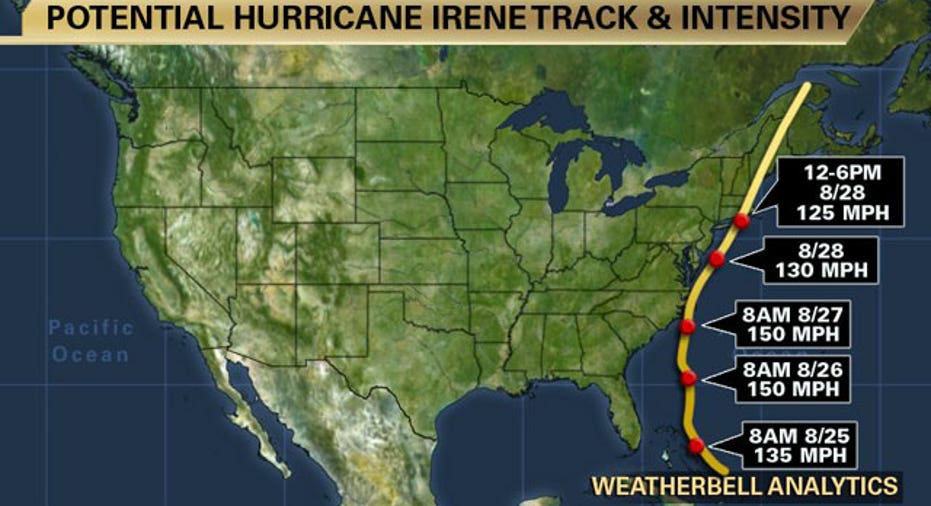Irene's Wrath to Add Billions to Insurer Woes

A hurricane barreling up the East Coast has the potential to cause the worst damages to the region in more than 50 years -- and insurers will likely feel the brunt of it.
Shares of Travelers (NYSE:TRV), Allstate (NYSE:ALL) and Chubb (NYSE:CB) all slipped more than 3% on Thursday when meteorologists ramped up their warnings that Hurricane Irene could pummel the Northeast on Sunday.
The prospect for damage is frightening for an industry of property and casualty insurers that has already faced abnormally high catastrophe losses this year just from natural disasters.
The forecasts are grim, and if the beast hits as hard as some predict she could cause billions of dollars in damages. AccuWeather expert senior meteorologist Alex Sosnowski said the impacts on lives, property, commerce and travel will be serious if Irene continues on her dangerous route northward.
While Irene is not forecast to track as far west, nor as fast, as Hazel did in 1954, it will ride up along the mid-Atlantic coast in such a way as to inflict major damage in many coastal and some inland communities, he wrote in a post on the AccuWeather web site.
To put this in perspective, Hazel would be considered a multi-billion-dollar storm that reached Category 4 levels at its peak by today's terms. Irene smashed into the Bahamas early on Thursday as a Category 3 hurricane, but some meteorologists warn it could ramp up speed over the Carolinas before "calming" to a Category 2 near Washington D.C. and New York.
Still, weather experts predict Irene will not be able to weaken quick enough to stop her from causing serious damages along the coast, including massive flooding, power outages and property damage from wind.
Even if she weakens or doesnt deliver a direct hit, insurance broker Willis warned the massive size of the storm, which is roughly 400 miles wide, could create significant storm surge that it says would likely impact the commercial insurance market, producing an immense rush of personal and commercial property claims.
The combination of storm surge plus the expected high tides could spell some very difficult conditions, Finnis said, noting that Sundays new moon is expected to bring high tides to the New York metro area.
(While potentially devastating for coastal inhabitants, a surge is less threatening to big insurers, as their home-insurance policies typically dont cover flooding caused this way.)
Irene marks only the start of the hurricane season and highlights the potential threat posed to an industry that has already been pummeled this year by deadly tornados and flooding in the Midwest, as well as earthquakes in New Zealand and Japan. Atlantic hurricane activity tends to peak in September.
Major U.S. insurers, including Allstate, Chubb and Travelers faced abnormally high catastrophe losses in the billions through the spring. Many swung to a quarterly loss as they struggled to contain rising expenses.
Allstate, for example, saw earnings fall $2.3 billion into the red during the second quarter. With $2.34 billion in catastrophe claims, the nations largest home and property insurer booked its worst disaster claims since Hurricane Katrina in 2005.
A Morgan Stanley report on Hurricane Irene that calculated which companies would see the brunt of damages should the storm pick up steam warned that Chubb, which collects nearly 14% of its premiums from Northeast states, would be hardest hit.
Allstate, which has about 12% of its business in the region, would be second-hardest hit, while Travelers, with 11%, would be third, according to the report.
But Dave Finnish, head of Willis North Americas property practice, said capital in the sector remains abundant. He predicted the industry would need to experience a loss event of $15 billion to $20 billion to materially change the market of commercial customers.
Catastrophe losses in 2005 totaled $66.1 billion from 24 disasters, with a majority of $43.6 billion estimated to have stemmed from the 1.75 million claims related to Katrina, according to Congressional Research Service.
Despite the severity of losses that year, though, the solvency and claims-paying ability of the property and casualty insurance industry was not threatened.
While its too soon to tell how the stock market will be impacted by the storm, history says weather has rarely impacted its operations in the past. The only hurricane to actually close the New York Stock Exchange was Hurricane Gloria in September 1985, though Hurricane Belle forced an early close in August 1976.



















